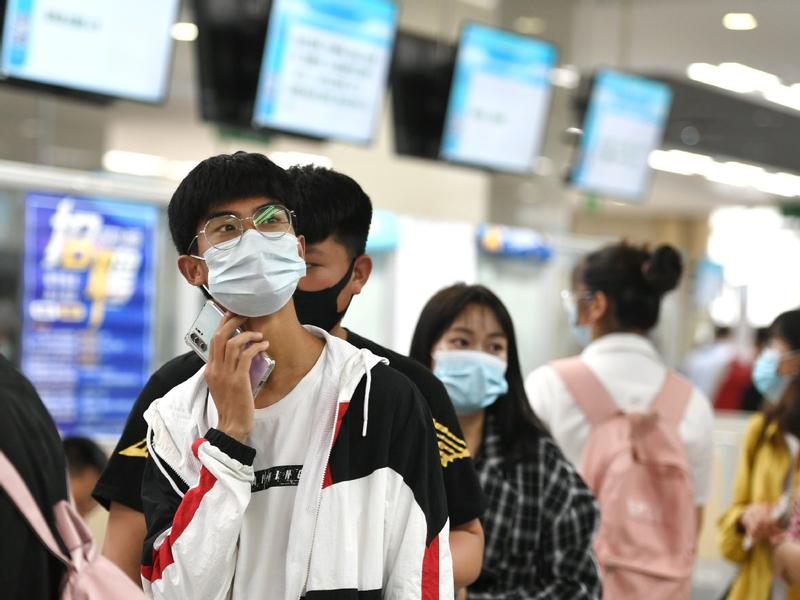 University students look at company profiles and available positions at a job fair in Nanjing, Jiangsu province, on May 16, 2021. (YANG SUPING / FOR CHINA DAILY)
University students look at company profiles and available positions at a job fair in Nanjing, Jiangsu province, on May 16, 2021. (YANG SUPING / FOR CHINA DAILY)
College graduates are precious human resources, given their creative and innovative potential, so the government has made their employment a top priority in its economic policy. But since economic growth slowed down due to the changing international environment and the impact of the COVID-19 pandemic, some enterprises, especially small and medium-sized enterprises, are facing increasing challenges in hiring new recruits.
The number of students who will graduate from college in 2022 is likely to be about 10.76 million, 1.67 million more than last year. Add to that the high numbers of overseas students expected to return home this year owing to the pandemic and the youths who graduated before last year but did not land a job and you will realize the huge pressure on the labor market.
The average number of jobs available per fresh college graduate fell to 0.88 in the fourth quarter of last year, according to a survey conducted by Renmin University of China. Although the figure was slightly higher than 0.79 in the second quarter of 2020, the decline two years ago was due to the impact of the pandemic.
In a way, the job market for college graduates is reflecting structural contradictions because a large number of new job-seekers cannot find employment while employers are facing difficulty in finding good, qualified workers. Indeed, there is a mismatch of supply and demand in the job market.
China's economy has been transitioning from the phase of rapid growth to a stage of higher-quality development, which will help the country to transform its growth model, improve its economic structure and foster new drivers of growth.
Also, some sectors, including education, internet, real estate and automobile, which used to have a high number of posts for graduates, have started cutting jobs. Along with this, structural adjustments in industries may also affect youth employment in the short term. On the other hand, innovation-oriented industries, such as artificial intelligence, robot and digital technology, have many vacancies that cannot be filled due to a lack of skilled graduates.
Besides, there is a gap between supply and demand in the job markets in different regions. While big cities are facing labor oversupply because many college graduates prefer to work in big cities, small and medium-sized cities are struggling to attract talents due to insufficient resources and opportunities.
Furthermore, many graduates are looking for the proverbial "iron rice bowl", or a stable job in a government department or State-owned enterprise, due to the impact of the pandemic and hence are reluctant to work for SMEs. For example, according to a recent Tsinghua University report, 69.9 percent of its graduates in 2021 found jobs in government departments and SOEs.
Therefore, the central government has been working with the labor market to help graduates find jobs in different fields, and authorities at different levels are taking measures to ensure employment security, offer subsidies and tax reductions, and improve employment services to encourage graduates to take up jobs at the grassroots level.
Still, efforts should be made to create more jobs suitable for graduates. Actually, as part of such efforts, the authorities held tens of thousands of career fairs in 2021, providing millions of vacancies for graduates.
But the government should also optimize the service mechanism to provide financial and technological support for capable graduates so they can start their own business, and further improve the employment service to provide subsidies and training for graduates, especially those with special needs.
In order to further ease the employment pressure this year, the government needs to make more efforts to help people, especially graduates, to find suitable jobs.
First, with an eye to the future, the authorities should monitor and analyze graduates' employment situation and, if need be, take remedial measures.
Second, the departments of human resources and education should cooperate to introduce employment services to help graduates get job information on the campus, and enterprises should be asked not to hire new recruits only from top colleges.
Third, communities should be involved to establish targeted service systems to help unemployed graduates find jobs, and the government should provide more job information and opportunities for those with special needs.
And fourth, graduates should be encouraged to work for SMEs to boost the private economy, and the SMEs should be given the same benefits and treatment that the SOEs get.
The author is an associate researcher at the Chinese Academy of Labor and Social Security.
The views don't necessarily reflect those of China Daily.



